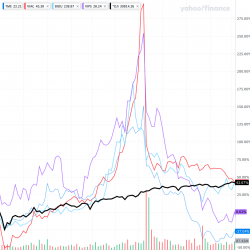Template:Archegos capsule: Difference between revisions
Amwelladmin (talk | contribs) Created page with "250px|thumb|left|When [[variation margin attacks]]Archegos took synthetic positions on margin in..." |
Amwelladmin (talk | contribs) No edit summary |
||
| Line 1: | Line 1: | ||
[[File:Archegos Positions.png|250px|thumb|left|When [[variation margin]] attacks]][[Archegos]] took [[Synthetic equity swap|synthetic]] positions [[Margin loan|on margin]] in on four comparatively [[Illiquidity|illiquid]] stocks — ViacomCBS, Tencent Music Entertainment, Baidu Inc and Vipshop — in sizes big enough to push up their market prices. As their valuations increased, so did the [[net equity]] Archegos held with its [[prime broker]]s. Archegos used that equity to double down on the same investments, pushing the stock further up. The higher the stock went, the thinner the trading volume. [[Archegos]] became an ever-larger part of the market. On 22 March, Archegos’ [[synthetic]] ViacomCBS position had a gross market value of USD5.1bn — more than 10% of ViacomCBS’ market capitalisation. Since Archegos was trading synthetically, ViacomCBS may not have realised it was the only buyer in town.<ref>{{credit suisse archegos report}}</ref> In any case, in a brutal cruel irony, ViacomCBS concluded that market sentiment was so strong that it should raise capital raising, and it duly announced a USD3bn share offering. There turned out to be only one buyer even interested in the offering — Archegos — and it was tapped out of fresh equity to invest. When it declined to participate, the capital raising failed and hell broke loose. | [[File:Archegos Positions.png|250px|thumb|left|When [[variation margin]] attacks: ViacomCBS, Tencent, Baidu and Vipshop against the Dow (black)]][[Archegos]] took [[Synthetic equity swap|synthetic]] positions [[Margin loan|on margin]] in on four comparatively [[Illiquidity|illiquid]] stocks — ViacomCBS, Tencent Music Entertainment, Baidu Inc and Vipshop — in sizes big enough to push up their market prices. As their valuations increased, so did the [[net equity]] Archegos held with its [[prime broker]]s. Archegos used that equity to double down on the same investments, pushing the stock further up. The higher the stock went, the thinner the trading volume. [[Archegos]] became an ever-larger part of the market. On 22 March, Archegos’ [[synthetic]] ViacomCBS position had a gross market value of USD5.1bn — more than 10% of ViacomCBS’ market capitalisation. Since Archegos was trading synthetically, ViacomCBS may not have realised it was the only buyer in town.<ref>{{credit suisse archegos report}}</ref> In any case, in a brutal cruel irony, ViacomCBS concluded that market sentiment was so strong that it should raise capital raising, and it duly announced a USD3bn share offering. There turned out to be only one buyer even interested in the offering — Archegos — and it was tapped out of fresh equity to invest. When it declined to participate, the capital raising failed and hell broke loose. | ||
Revision as of 15:37, 27 November 2021

Archegos took synthetic positions on margin in on four comparatively illiquid stocks — ViacomCBS, Tencent Music Entertainment, Baidu Inc and Vipshop — in sizes big enough to push up their market prices. As their valuations increased, so did the net equity Archegos held with its prime brokers. Archegos used that equity to double down on the same investments, pushing the stock further up. The higher the stock went, the thinner the trading volume. Archegos became an ever-larger part of the market. On 22 March, Archegos’ synthetic ViacomCBS position had a gross market value of USD5.1bn — more than 10% of ViacomCBS’ market capitalisation. Since Archegos was trading synthetically, ViacomCBS may not have realised it was the only buyer in town.[1] In any case, in a brutal cruel irony, ViacomCBS concluded that market sentiment was so strong that it should raise capital raising, and it duly announced a USD3bn share offering. There turned out to be only one buyer even interested in the offering — Archegos — and it was tapped out of fresh equity to invest. When it declined to participate, the capital raising failed and hell broke loose.